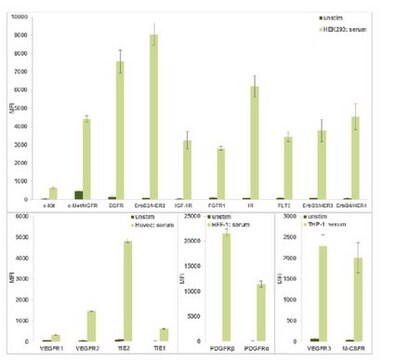48-660MAG
MILLIPLEX MAPK/SAPK Signaling 10-Plex Kit - Cell Signaling Multiplex Assay
Synonym(s):
Cell Signaling Kit, MAPK/SAPK 10-Plex Kit
About This Item
Recommended Products
species reactivity
human
Quality Level
manufacturer/tradename
Milliplex®
technique(s)
multiplexing: suitable
assay range
inter-assay cv: 4-13%
intra-assay cv: 3-10%
detection method
fluorometric (Luminex xMAP)
storage temp.
2-8°C
General description
Specificity
Application
- An overnight (4°C) incubation is recommended for best results.
- This assay requires 25 μL diluted cell lysate.
- This kit must be run using Assay Buffer 2 (provided).
- 1 - 25 μg cell lysate/well (recommended starting concentration is 20 μg cell lysate/well).
Signaling
Legal Information
Disclaimer
signalword
Danger
hcodes
Hazard Classifications
Acute Tox. 4 Oral - Aquatic Acute 1 - Aquatic Chronic 2 - Eye Dam. 1 - Skin Irrit. 2
Storage Class
10 - Combustible liquids
Certificates of Analysis (COA)
Search for Certificates of Analysis (COA) by entering the products Lot/Batch Number. Lot and Batch Numbers can be found on a product’s label following the words ‘Lot’ or ‘Batch’.
Already Own This Product?
Find documentation for the products that you have recently purchased in the Document Library.
Related Content
Uncover how cells communicate with MILLIPLEX® cell signaling multiplex assays. Multiplexing with cell signaling phosphoprotein assays based on Luminex® xMAP® technology helps researchers measure phosphoproteins and total proteins within the same or different pathways from a single sample.
Learn how multiplexing with MILLIPLEX® multiplex assays can help simplify cancer research by measuring multiple circulating biomarkers at once. Find multiplex panels to analyze JAK-STAT, mTOR, MAPK, SAPK, TGFβ signaling pathways, and more.
See how multiplexing the inflammation signaling pathway with MILLIPLEX® inflammation assays or cell signaling assays can help researchers bridge the gap between immunology and cell signaling, including investigating T cell signaling, Th Cell differentiation, inflammatory response signaling, and sepsis signaling.
Our team of scientists has experience in all areas of research including Life Science, Material Science, Chemical Synthesis, Chromatography, Analytical and many others.
Contact Technical Service




